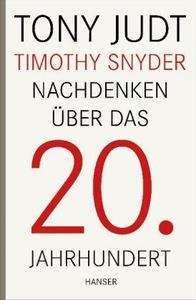Nachdenken über das 20. Jahrhundert

Resumen del libro
Tony Judt, geboren 1948 in London, ist Historiker. Sein Arbeitsschwerpunkt liegt im Bereich der europäischen Geschichte seit Ende des 19. Jahrhunderts. Er ist seit 1995 Direktor des von ihm gegründeten Remarque-Instituts an der New York University.
Judt studierte an der Universität Cambridge. Er erwarb dort 1969 den Bachelor of Arts und 1972 den PhD in Geschichtswissenschaft. 1966 arbeitete er in einem Kibbutz in Machanaim und während des Sechstagekrieges 1967 als Fahrer und Übersetzer für die israelische Armee. Seine prozionistische Haltung wurde aber immer stärker erschüttert. Judt trat 2003 durch ein Plädoyer für eine Einstaatenlösung für Palästina hervor. Für seine Werke erhielt Tony Judt verschiedene Auszeichnungen, u. a. 2007 den "Hannah Arendt-Preis" für politisches Denken.
Autorenportrait
--------------------------------------------------------------------------------
Tony Judt, the author of eleven books, is Erich Maria Remarque Professor of European Studies at New York University and director and founder of the Remarque Institute.
Personenportrait
--------------------------------------------------------------------------------
Timothy Snyder wurde 2012 mit dem Leipziger Buchpreis zur Europäischen Verständigung ausgezeichnet.
Biografía del autor
x{0026}lt;P x{0026}lt;B Tony Judt x{0026}lt;/B (Londres, 1948-Nueva York, 2010) realizó sus estudios en el King's College de Cambridge y en la École Normale Supérieure de París. Impartió clases en las universidades de Cambridge, Oxford, Berkeley y Nueva York, y en esta última ocupó la cátedra de Estudios Europeos, que él mismo fundó en 1995, y fue director del Remarque Institute. Entre sus publicaciones cabe destacar x{0026}lt;I El peso de la responsabilidadx{0026}lt;/I (Taurus, 2014), x{0026}lt;I ¿Una gran ilusión?x{0026}lt;/I (Taurus, 2013), x{0026}lt;I Pensar el siglo XXx{0026}lt;/I (Taurus, 2012), x{0026}lt;I El refugio de la memoriax{0026}lt;/I (Taurus, 2011), x{0026}lt;I Algo va malx{0026}lt;/I (Taurus, 2010), x{0026}lt;I Sobre el olvidado siglo XX x{0026}lt;/I (Taurus, 2008), x{0026}lt;I Pasado imperfectox{0026}lt;/I (Taurus, 2007), x{0026}lt;I Postguerrax{0026}lt;/I (Taurus, 2006), considerado uno de los diez mejores libros de 2005 por la x{0026}lt;I New York Times Book Reviewx{0026}lt;/I , galardonado con el Premio Council on Foreign Relations Arthur Ross y finalista del premio Pulitzer, y x{0026}lt;I Cuando los hechos cambianx{0026}lt;/I (Taurus, 2015). Judt colaboró en diferentes medios de Europa y Estados Unidos, como x{0026}lt;I The New York Review of Booksx{0026}lt;/I , el x{0026}lt;I Times Literary Supplementx{0026}lt;/I o x{0026}lt;I The New York Timesx{0026}lt;/I . En 2007 recibió el Premio Hannah Arendt, y en 2009 el Orwell Prize for Lifetime Achievement. Falleció en agosto de 2010 a causa de una enfermedad degenerativa.x{0026}lt;/P








